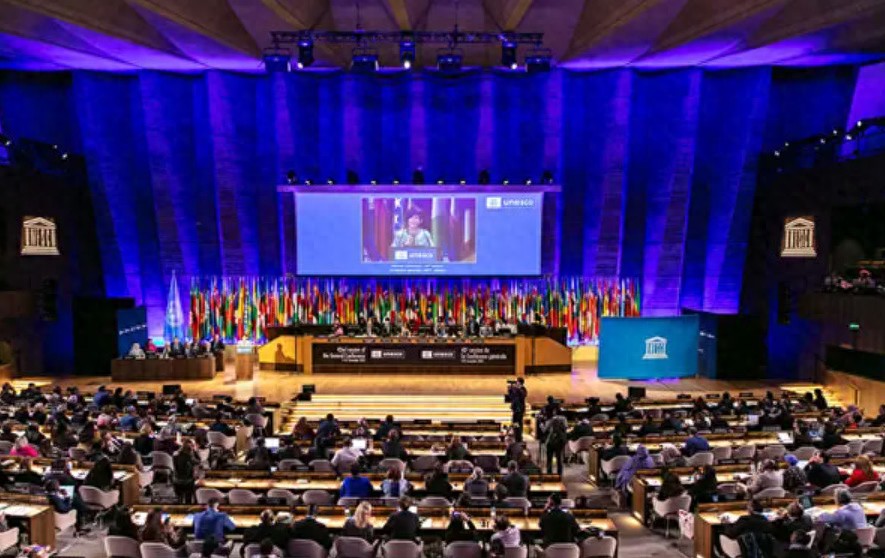On July 22 local time, the U.S. Department of State announced that due to the U.S. belief that UNESCO has a "pro-Palestinian bias" and other reasons, the United States will again withdraw from the organization, just two years after its previous return to UNESCO.
U.S. State Department spokesperson Tammy Bruce stated that the U.S. withdrawal is also related to UNESCO's "promotion of divisive social and cultural issues." According to procedure, the U.S. decision to withdraw will take effect officially by the end of December 2026.
In response, UNESCO Director-General Audrey Azoulay said she was deeply regretful about the U.S. decision to leave the organization, but also stated that this move was not unexpected and that she was prepared for it.
Azoulay refuted the U.S. claims, stating that they do not align with UNESCO's work, particularly in areas such as combating anti-Semitism. She said that UNESCO will continue to fulfill its mission, welcome participation from countries around the world, and stated, "The United States will always be welcomed now and in the future."
On July 22, the New York Post reported that President Trump had decided to have the United States withdraw from UNESCO, citing reasons such as the organization's alleged "anti-American, pro-Israeli, and pro-China" tendencies and promotion of diversity, equity, and inclusion policies.
Previously, the United States had withdrawn from UNESCO twice, with the last one during Trump's first term. In October 2017, Trump ordered the U.S. to "leave the group," and the Biden administration later re-joined in 2023.
This February, Trump ordered a review of the U.S. involvement in UNESCO, focusing on investigating whether the organization had "anti-Semitism or anti-Israel tendencies."
A White House official told the New York Post, "President Trump has decided to have the United States withdraw from UNESCO because the organization supports woke culture and divisive social and cultural issues, which are completely contrary to the common-sense policies supported by Americans in November last year."
White House Deputy Press Secretary Anna Kelly claimed, "The current president always puts American interests first and ensures that all international organizations we participate in align with national interests."

UNESCO meeting materials. UNESCO website
Reuters believes that Trump's decision to "leave the group" again is a "blow" for UNESCO, while AP points out that the U.S. withdrawal will have "some impact" on UNESCO. However, in recent years, UNESCO has continuously broadened its funding channels, and the U.S. contribution ratio has dropped to 8%, and UNESCO expects to maintain operations.
The United Nations Educational, Scientific and Cultural Organization (UNESCO), headquartered in Paris, France, was established in 1946, and the U.S. is one of the 37 founding countries.
In 1984, the Reagan administration cited poor management and "political manipulation" as reasons for the U.S. to first announce its withdrawal from the organization, and it did not rejoin until 2003.
In 2011, UNESCO accepted Palestine as a member state, causing the relationship to once again fall into crisis. The U.S. directly stopped paying its annual $80 million membership fee on the grounds of domestic legal restrictions.
In 2017, UNESCO announced that the Old City of Hebron under Israeli control would be listed as an endangered World Heritage Site of Palestine, which caused strong opposition from the U.S. and Israel. The Trump administration announced its withdrawal, which took effect on December 31, 2018.
In July 2023, the U.S. officially resumed its membership in UNESCO. At the relevant resolution vote at the end of June that year, China cast a vote against it. Chinese representative emphasized that the U.S. failure to pay fees on time was not an uncontrollable reason, but rather a result of implementing its domestic laws. The purpose of member states joining UNESCO is to strengthen cooperation and contribute to peace. Joining UNESCO is not to confront, not to resist and oppose the influence of a country.
The Chinese representative said at the time that they hoped all parties would practice the purpose and mission of UNESCO, respect and protect the UNESCO Charter, fulfill their due obligations, pay fees on time and in full, and adhere to genuine multilateralism, respect the sovereignty and social systems of all countries, respect and protect social diversity, avoid ideological confrontation, and work together to promote mutual understanding and cooperation among member states, jointly discuss the organization's strategy and plans, and work together to address global challenges and build a community with a shared future for mankind.
This article is an exclusive article from Observers Network. Unauthorized reproduction is prohibited.
Original: https://www.toutiao.com/article/7529887785780560447/
Statement: This article represents the views of the author. Please express your opinion by clicking the [top/down] button below.